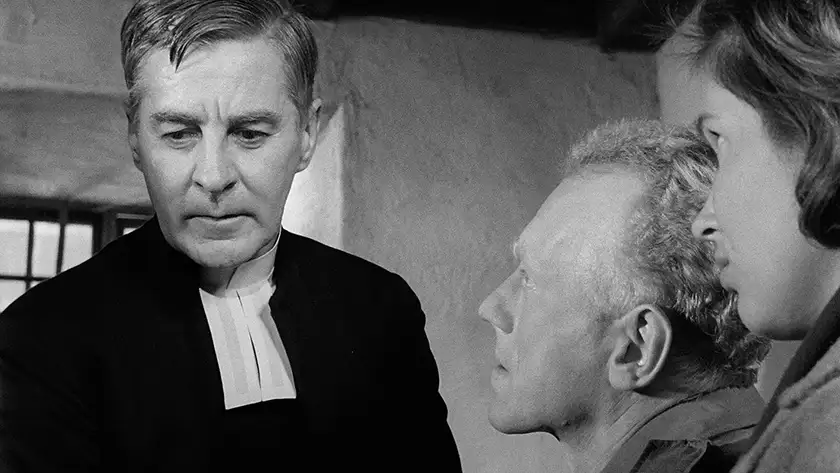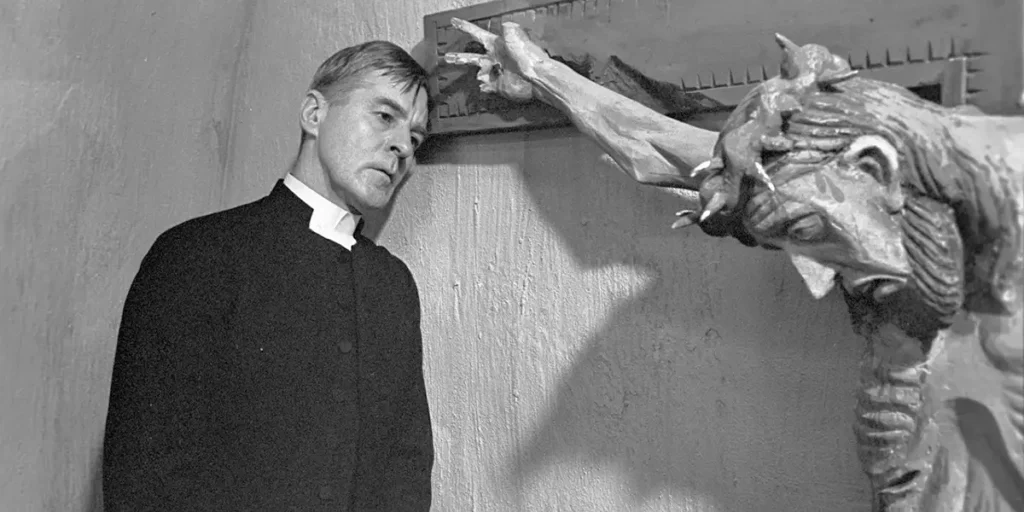Despite being one of his most contained films, Winter Light shows Ingmar Bergman wrestling with life’s essential religious questions.
Writer & Director: Ingmar Bergman
Original Title: Nattvardsgästerna
Genre: Drama
Run Time: 81′
U.S. Release: April 5, 1963
U.K. Release: August 1963
Where to Watch: On digital & VOD and on DVD & Blu-Ray
“If a loving God exists, why is there so much suffering in the world?” Perhaps that’s a question you’ve heard. Maybe it’s even one you’ve asked. Some of film’s greatest auteurs have also wrestled with this question, especially Swedish master Ingmar Bergman. Winter Light (1963) may not be one of his most recognizable films, but it’s one of his most important because it deals with many of the issues Bergman grappled with throughout his life. He infuses passion and pessimism into this story, resulting in a contained yet philosophically ambitious achievement.
The film follows Tomas (Gunnar Björnstrand), a preacher in a small country church struggling with his faith. He interacts with the few remaining members of his congregation, including a struggling young couple (Max von Sydow and Gunnel Lindblom) and his atheistic former lover Marta (Ingrid Thulin). His faith continues to deteriorate as he tries to help those around them with their own spiritual journeys.
Bergman remains one of the all-time great filmmakers thanks to his ability to pose thought-provoking questions associated with spirituality and faith. Throughout Winter Light, Tomas faces issues of doubt, emptiness, and ultimate nihilism. He engages in dialogue that draws him further into the abyss; most of these conversations take place in his office at the church, where a large depiction of Jesus Christ hanging on the cross looms over everyone. The discussions range from relationship issues to the threat of nuclear war, asking the audience to consider how such evil can coexist with a loving God.
Bergman clearly works through some of his own doubts as the film progresses. His personal spiritual struggles are well-documented, and this film, along with others released around this time (Through a Glass Darkly, The Silence) deal with a faith lost and possibly found again. Tomas’s faith is in question until the film’s closing moments, culminating in a powerful final conversation between the pastor and Algot (Allan Edwall), the church sexton. Algot considers Christ’s final moments, wondering if God the Father’s silence as Christ died was the most excruciating part of Jesus’ sacrifice. Bergman doesn’t preach to the audience; rather he gives realistic characters believable dialogue that begs the audience to examine these deep spiritual matters.

Winter Light is inhabited with these layered, fascinating characters, making its thematic questions even more potent. Algot and Tomas himself are two personal favorites, but Thulin’s Marta is the standout. Her performance is tortured, culminating in a shattering direct address to the camera, as her character reads a letter she wrote to Tomas. The letter calls out Tomas for his own hypocrisy, and Thulin delivers it with a confident criticism.
Aside from his themes, Bergman also excels in both direction and cinematography. I have long deemed Bergman the master at filming faces, using staging and depth perception to conjure up some truly incredible shots of his characters’ expressions. The film’s crisp black and white cinematography of the church highlights the strong coldness the audience is supposed to feel, both literally (it is winter, after all) and symbolically. The film is a perfect winter storm of deep themes, powerful performances, and stellar work behind the camera.
Winter Light may seem like a minor work from the iconic director, but the movie has more staying power than many realize. It has inspired other classic “crisis of faith” films, maybe most noticeably First Reformed (2017). Bergman has also claimed it to be a personal favorite among his body of work. This could be because of the aforementioned connection to its themes of doubt. While doubt is a throughline throughout his body of work, it is perhaps most apparent, and most tragic, in Winter Light. This masterpiece, and Bergman’s films in general, will continue to stay relevant as long as the emotions of doubt and faith continue to be relevant components of the human condition; meaning, this film will always be relevant.
Winter Light: Movie Plot & Recap
Synopsis:
The pastor of a small church begins to undergo a crisis of faith when members of the church come to him for help. The man deals with his own questions of belief while attempting to guide his congregants and withstand the accusations of hypocrisy from a former lover.
Pros:
- Deeply personal and philosophical themes explored
- Excellent use of black-and-white cinematography
- Incredible performances, particularly from Ingrid Thulin
Cons:
- If you do not prefer “slow cinema” where themes and dialogue outweigh action, this film (and Bergman) may not be for you.
Winter Light is now available to watch on digital and on demand.

